How does coffee flavor come from? why coffee beans have a variety of flavor reasons and characteristics
When we drink coffee, we always say that this cup of coffee has a good taste of citrus juice and that cup of coffee has a rich flavor of chocolate cream. I wonder if when you are tasting coffee, have you ever thought about how the flavor we drink comes from?
Now we drink hand-brewed coffee, will emphasize the origin of this coffee, just as the front street store guests, Qianjie will first ask guests, "what flavor of coffee do you like" or "which country (producing area) do you often drink coffee?" This is because different coffee producing countries (regions) have different flavor characteristics, that is, the flavor of the producing area that is often mentioned in Qianjie. Just as the concept of boutique coffee was put forward at that time, it is believed that coffee has the flavor attribute of the producing area.
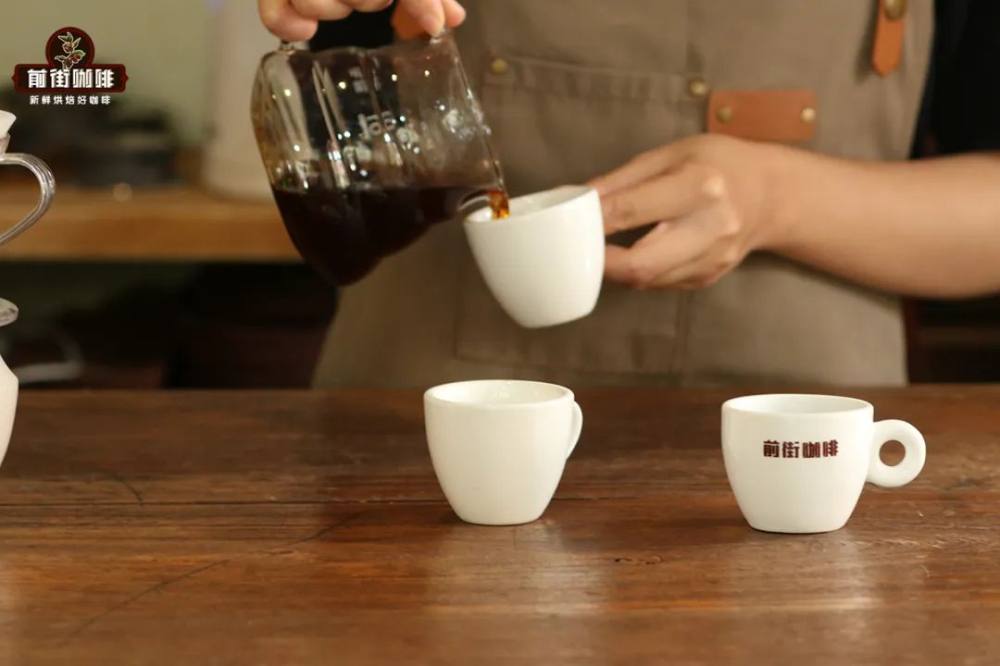
There is an old saying in the flavor of the producing area, "tangerine is born in Huainan and trifoliate orange in Huaibei." It shows that even if the same kind of plant is planted, the fruit grown in different places has different taste. The same is true of coffee, which is limited by agricultural geography factors such as soil, altitude, variety, planting pattern and so on. Each producing area has different coffee flavor characteristics.
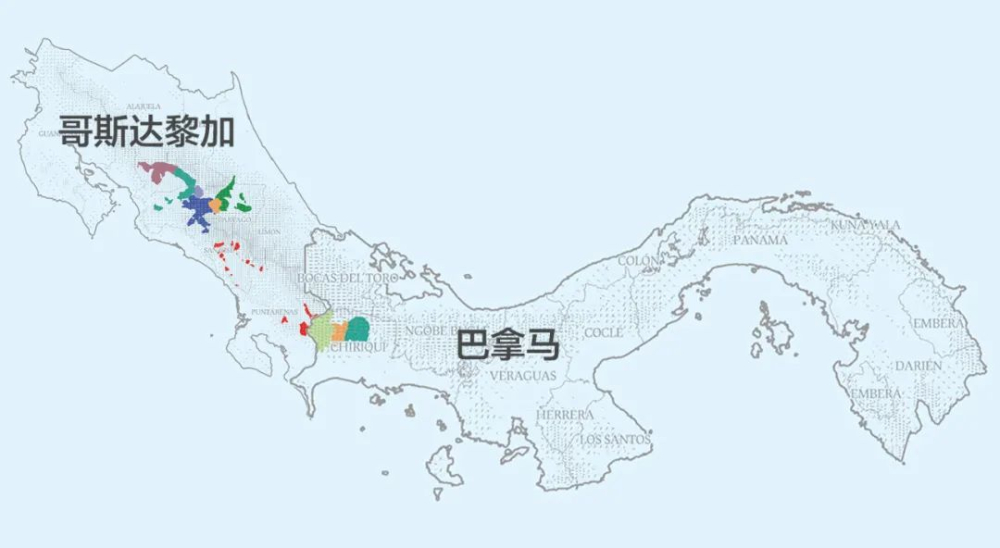
A classic example is Rosa Coffee. We all know that Rosa Coffee is famous all over the world from Panama. It was later learned that the roots of the Panamanian summer traced back to Ethiopia. Let's not talk about the front street so far, let's just say that the rosy summer of Costa Rica and Panama was introduced from Costa Rica. The two countries are close to each other, and after Panama rose to fame, Costa Rican coffee farmers began to pay attention to it. Now on the market, we can easily buy the rose summer of Costa Rica and Panama. Interested friends might as well buy it and compare it. You can understand how climate, altitude, soil, and planting patterns affect the flavor of coffee. In the past, when we talked about coffee, we used to talk about where the coffee tasted good. Coffee such as Sandoz Coffee, Blue Mountain Coffee, Yega Chuefei Coffee and Kenyan Coffee are all marked by the name of the place of origin, which also confirms the flavor of the producing area mentioned in the front street. Coffee varieties are not ignored, but the consideration of the varieties chosen by coffee farmers at that time is not only the flavor, but also the disease resistance, insect resistance and yield. Therefore, although the names of the varieties are different, the taste difference between the varieties of coffee will not be very big. For example, the relationship between the original species and varieties is between the iron pickup, Bourbon, Kaddura and Kaduai, and there are differences in flavor, but not very much. For a long time, the agricultural departments of major coffee-producing countries have been studying and breeding coffee varieties, and the aim is to find varieties with good flavor, high yield, disease resistance and insect resistance, as well as varieties such as Rosa. Let us find that there are some varieties with such amazing flavor in coffee, so we step up the exploration of looking for more delicious coffee varieties. For example, Eugene Odes (mother), Pacamara, WushWush, who competed in the past two years.
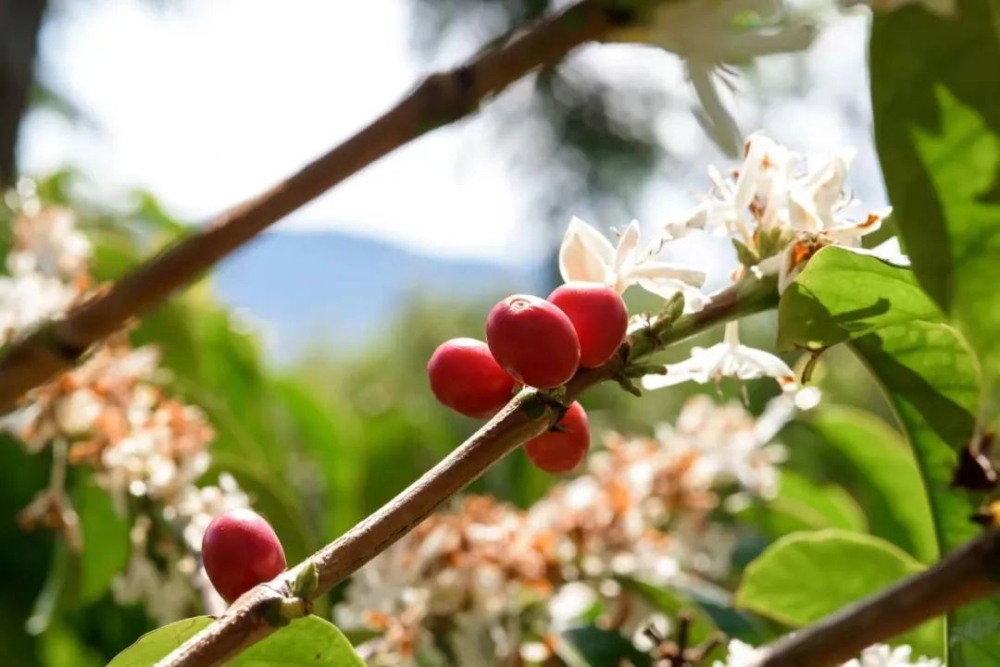
At the same time, coffee research institutions in various countries have also tried to select coffee varieties with high yield and disease resistance by artificial cross breeding, but the flavor performance of this kind of coffee is slightly inferior.
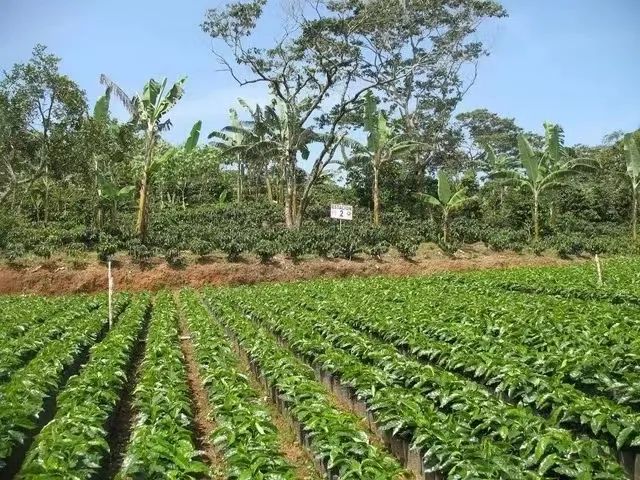
The original change of coffee treatment is to purely improve the efficiency and quality, such as the water washing treatment that appeared in the 18th century, which is a new treatment for the traditional sun treatment, which has the efficiency and quality of crushing the traditional sun treatment. At that time, the sun was rough, which simply spread the coffee fruit on the ground to dry. Affected by the weather and soil colonies, moldy beans and rotten beans were very common, so the quality was poor and time-consuming (the sun takes 3-5 weeks). The later washing treatment removed the peel and pulp and then dried the pectin, which shortened the drying time, improved the efficiency, and the quality was also high, that is, it consumed more water. The half-sun in Brazil and the honey treatment in Costa Rica are also ways to improve quality and efficiency according to local conditions. It can be understood that the higher the quality of coffee, the better the taste.
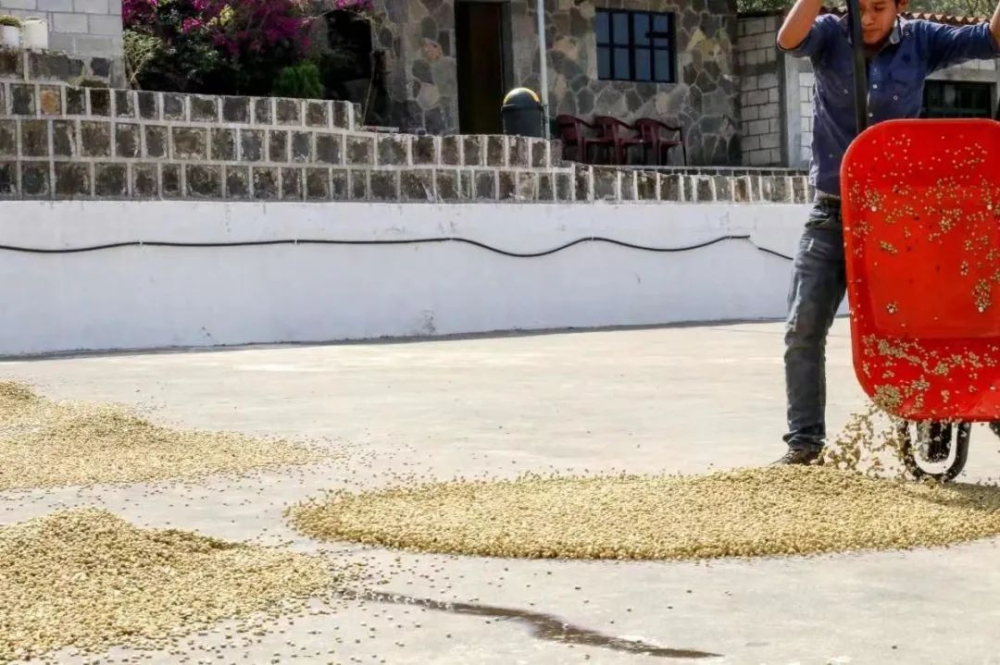
Later, boutique coffee became popular and began to pay attention to flavor. The flavor of coffee beans in the same place was also different from that of water washing, because there were more substances (whole fruits) involved in fermentation in the sun treatment. so the flavor will be sweeter and richer, and the fermentation flavor will be heavier. The water washing treatment because only coffee beans participate in fermentation, so the flavor will be more sour, clean and bright. In addition, the reason why the quality of sun treatment is so poor in the past is that Taiyuan began to use elevated drying beds to isolate soil pollution, often turn over to avoid excessive fermentation and mildew of the bottom coffee, and use a dryer to dry it on rainy days. Use this series of measures to produce high-quality sun-cured coffee, sweet and full flavor is also naturally shown.
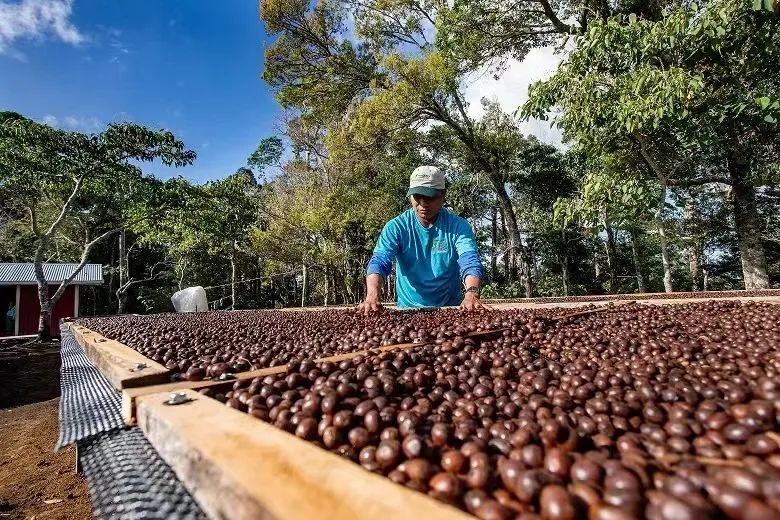
At present, more and more coffee farms are studying the use of anaerobic and adding enzymes to enrich the flavor of coffee, which is also an important factor in the formation of coffee flavor. What is said in front of the street before baking is to "save flavor" for coffee beans, and baking is to show the flavor of coffee beans. After being heated to a certain extent, the aroma substances in raw coffee beans will begin to undergo complex degradation and polymerization, resulting in more abundant volatile aromatic compounds. It is mainly due to the Mena reaction and caramelization reaction. Mena reaction basically runs through the whole baking process. Under continuous heating, the amino acids that make up protein in raw beans, as well as reducing sugars such as glucose, fructose and lactose, undergo complex degradation and polymerization to produce aromatics and compounds. this process is constantly repeated in the process of heating, producing more aromatic compounds like snowballs.
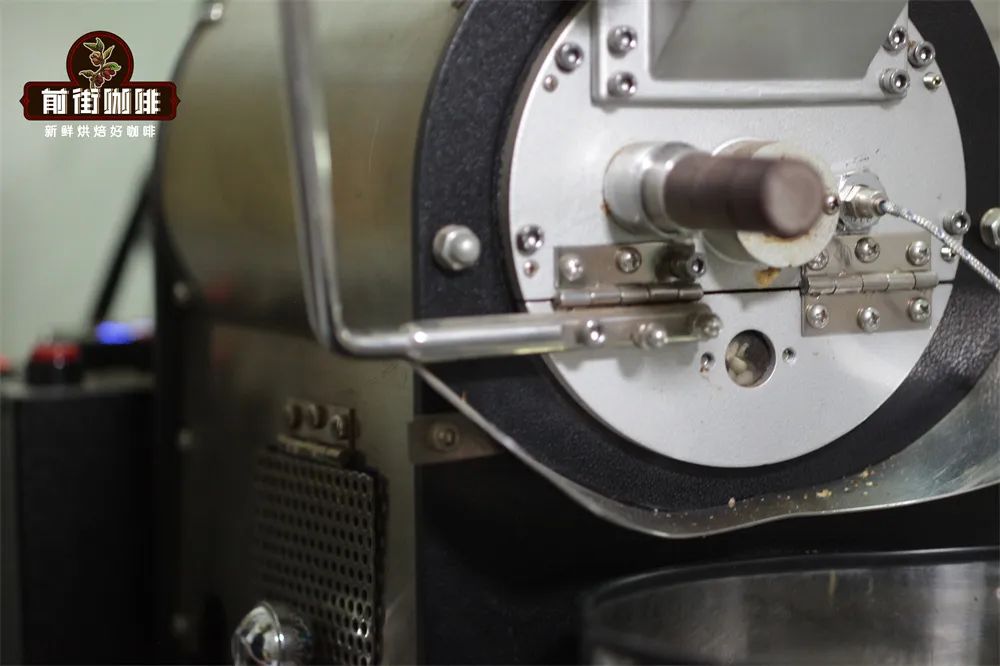
In this process, more than 600 volatile aroma compounds are produced in coffee beans. With the increase of reaction time, fresh floral and fruity aromas are produced first, and then more nutty, vanilla, cream and caramel aromas are produced, but the aromas of flowers and fruits will begin to weaken. The caramelization reaction occurs after an explosion, when sugars turn brown, producing aromatic compounds such as diacetyl (the source of cream aroma), furan compounds (the source of caramel aroma), hydroxymethylfurfural (the source of honey and fruit juice aroma). However, excessive caramelization will develop into carbonization, and the bitter taste will be greatly increased.
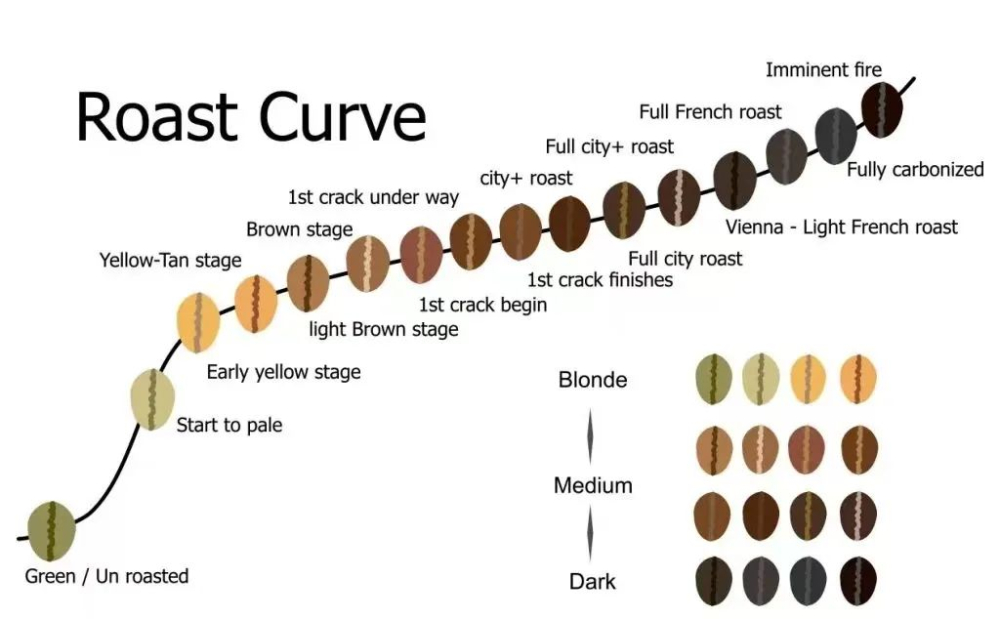
If there are friends who don't understand, it doesn't matter. Qianjie says it again in vernacular. When coffee is roasted, it is generally believed that the demarcation of "ripe" is "an explosion", and it can be baked at any time after an explosion. The earlier the baking, the shallower the baking degree of coffee beans, the sour taste of fruit, the more obvious the fragrance of flowers. The later the baking, the deeper the roasting of the beans, the heavier the roasting flavor of the coffee, and the thicker the taste of nutty chocolate caramel. Brewing and brewing is the last step of flavor expression. In the process of seed selection, planting, processing, roasting and brewing of a cup of coffee, the upstream link will have a greater impact on the coffee flavor, while the downstream brewing has relatively little effect on the coffee flavor. The lower limit of the flavor of coffee beans is determined by the variety, planting and treatment, and the lower limit of high-quality coffee beans will naturally be higher. Roasting determines whether the cup of coffee is sour or bitter, which cannot be changed by brewing.
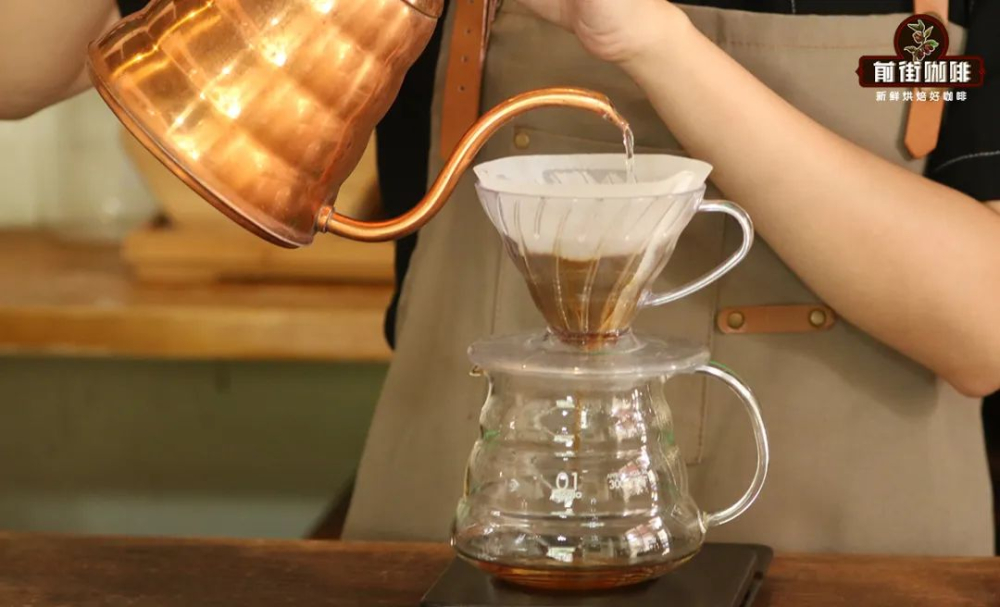
But brewing can adjust the bias of coffee, such as simultaneously sour coffee, can use different brewing parameters to make a cup of coffee tend to bright acidity, a cup of coffee tends to juice-like sweet and sour feeling.
Important Notice :
前街咖啡 FrontStreet Coffee has moved to new addredd:
FrontStreet Coffee Address: 315,Donghua East Road,GuangZhou
Tel:020 38364473
- Prev

Latte pull pattern thousand-layer heart production method latte art drawing step picture illustration
Before that, Qianjie shared with you the method of drawing flowers with the pattern "Big Peach Heart". The status of this pattern is like espresso in Italian coffee, which is the most basic and basic. But many patterns of flower drawing are deformed through the derivation of peach hearts, and have skillfully mastered this foundation.
- Next

What is the best water temperature for hand-brewed coffee? Effect of brewing temperature on flavor and taste of coffee
Everyone tends to use a higher temperature to extract the water temperature of hand-brewed coffee, because high temperature can not only improve the extraction efficiency, but more importantly, it can produce rich sweet and sour aromas. Basically, the water temperature used to make coffee by hand is rarely lower than 80 degrees Celsius. So, is it possible to use a temperature lower than this to make coffee?
Related
- Beginners will see the "Coffee pull flower" guide!
- What is the difference between ice blog purified milk and ordinary milk coffee?
- Why is the Philippines the largest producer of crops in Liberia?
- For coffee extraction, should the fine powder be retained?
- How does extracted espresso fill pressed powder? How much strength does it take to press the powder?
- How to make jasmine cold extract coffee? Is the jasmine + latte good?
- Will this little toy really make the coffee taste better? How does Lily Drip affect coffee extraction?
- Will the action of slapping the filter cup also affect coffee extraction?
- What's the difference between powder-to-water ratio and powder-to-liquid ratio?
- What is the Ethiopian local species? What does it have to do with Heirloom native species?

